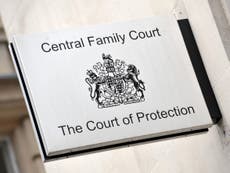‘Home became a prison’: Calls to national domestic abuse helpline soar by more than third in pandemic
‘Lockdown restrictions have given perpetrators of abuse unprecedented power and control, and our staff received an overwhelming number of calls,’ says expert

Your support helps us to tell the story
From reproductive rights to climate change to Big Tech, The Independent is on the ground when the story is developing. Whether it's investigating the financials of Elon Musk's pro-Trump PAC or producing our latest documentary, 'The A Word', which shines a light on the American women fighting for reproductive rights, we know how important it is to parse out the facts from the messaging.
At such a critical moment in US history, we need reporters on the ground. Your donation allows us to keep sending journalists to speak to both sides of the story.
The Independent is trusted by Americans across the entire political spectrum. And unlike many other quality news outlets, we choose not to lock Americans out of our reporting and analysis with paywalls. We believe quality journalism should be available to everyone, paid for by those who can afford it.
Your support makes all the difference.Calls to the UK’s national domestic abuse helpline have surged by more than a third in the wake of the Covid crisis – raising fears lockdown measures are blocking victims’ paths to safety.
The National Domestic Abuse Helpline saw a 34 per cent rise in contacts and calls between April and December last year compared to the same period the previous year. While there were 85,771 calls in 2019, the number had soared to 114,986 last year.
Meanwhile, new data shows a 10 per cent increase in the number of domestic abuse offences recorded by the police in the year ending September 2020 – with some 842,813 offences – in comparison to the previous year.
Sophie Francis-Cansfield, senior campaigns & policy officer at Women's Aid, told The Independent: “Despite the increase in cases recorded by the police, emerging research shows that lockdowns make reporting to the police harder and is keeping survivors in abusive relationships.
“Women’s Aid’s direct services, like our live chat helpline, are seeing similar increases in demand. Our research has clearly shown that lockdown has shut down routes to support and safety for women and children experiencing abuse.”
She raised concerns that when Covid lockdown restrictions eventually begin to be lifted, increasing numbers of women living with violent partners will choose to flee.
“Perpetrators will start to feel that they losing control,” Ms Francis-Cansfield added. “This will put survivors at risk of harm and it is essential that the government, the public sector and specialist support services are prepared for a surge in demand for support at this point.”
New data shows a 36 per cent surge in calls to the national LGBT+ helpline run by Galop between April and December last year – with calls rising from 3,679 to 5,011. Calls from 16- to 24 year-olds increased by over half.
Lisa King, of Refuge, which runs the national domestic abuse helpline as well as being the largest provider of shelters for victims, said: "While ‘normal life’ ground to a standstill during the Covid-19 crisis, home became a prison for millions of women and children trapped with abusive partners.
"Lockdown restrictions have given perpetrators of abuse unprecedented power and control, and our staff received an overwhelming number of calls from women and girls seeking support on how to stay safe, as well as from many who were disclosing abuse for the first time."
She argued lockdown does not in itself cause violence but can worsen pre-existing patterns of abuse.
A report released by MPs at the end of April last year revealed domestic abuse killings in the first 21 days of the first lockdown were double the total of an average period in the past decade. Meanwhile, almost one in seven domestic abuse victims who are currently enduring abuse at the hands of their partners told Women’s Aid it had got worse in the wake of the coronavirus crisis.
Nicole Jacobs, domestic abuse commissioner, told The Independent the situation for victims is “extremely serious” as she said rising demand is placing serious pressure on services “desperately trying to support” survivors.
She added: "All helpline services are telling me that they are seeing an increasing complexity in the types of cases that they are getting and they believe that this is partly because victims have been forced into isolation for long periods of time with their abusers."
Boris Johnson recently used an address to the nation to emphasise those trapped at home with abusers were free to leave the house during lockdown, while pharmacies have launched a codeword scheme in conjunction with the government to provide a “lifeline” to victims.
Yvette Cooper, a Labour MP who chairs the Home Affairs Committee, said: “This new data is deeply troubling. The increase in domestic abuse that began at the start of the Covid-19 pandemic has continued throughout the year and shows no sign of abating.
“We called for more support for victims of abuse in the first lockdown, but it is clear that more action is needed. As lockdown continues we cannot allow this to be a hidden crisis and efforts must be redoubled to overcome the unique challenges faced in providing support during lockdown.”
The Independent recently reported cash-strapped services have been forced to turn away victims fleeing abusive partners – with leading services warning bed shortages push survivors into homelessness or into returning to their abuser where they face further torment.
Providers say they have long been battling severe economic uncertainty due to austerity measures forcing refuges to close or cut their services, but surging demand for help during the pandemic has compounded an already fragile financial situation.
Anyone who requires help or support can contact the National Domestic Abuse Helpline which is open 24/7 365 days per year on 0808 2000 247 or via their website https://www.nationaldahelpline.org.uk/


